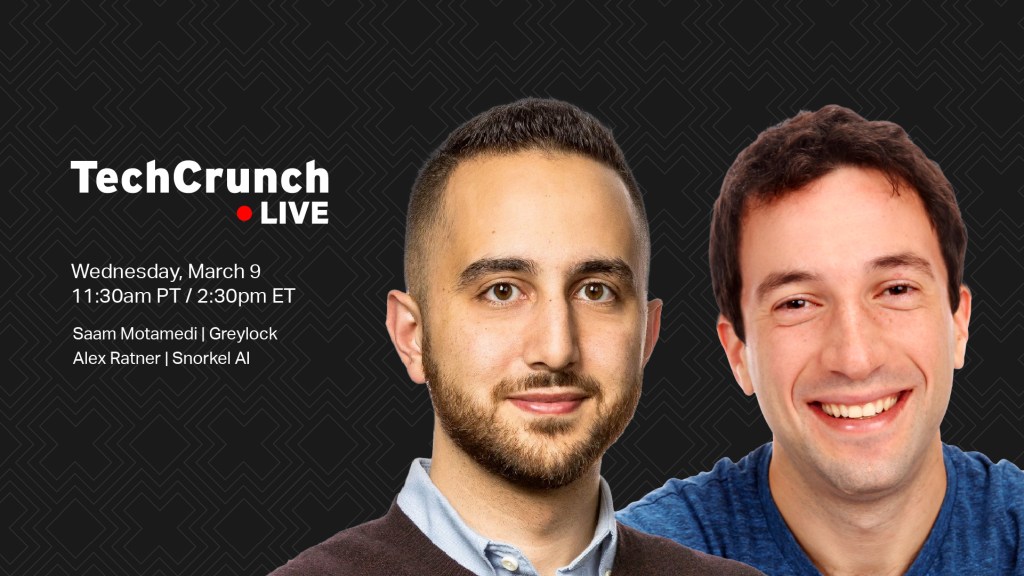Storytelling is an art as old as civilization, but it’s rarely taught anywhere despite the fact that the ability to tell a good story is instrumental to success in many, many fields.
Fundraising is one area where good storytelling can be table stakes, but few founders know how to communicate clearly and succinctly how their idea solves a problem.
Snorkel.AI’s co-founder, and CEO, Alex Ratner, honed his storytelling chops at a Stanford lab, and that ability, he said on a recent TechCrunch Live episode, was key to helping him raise $135.3 million over four rounds since the company was founded in 2019.
“I was a pitch deck nerd even before giving a real pitch deck,” Ratner said. “I had it drilled into me on the academic side, that communication is everything. You could have the fanciest, highest-performing method. Still, it means nothing if you cannot communicate how it maps to real problems and how it is contextualized within alternative solutions.”
Ratner was joined on TechCrunch Live by Saam Motamedi, Greylock partner and the lead investor in Snorkel.AI’s $3.3 million seed round.
Listen to the episode, and it’s obvious Alex Ratner is good at telling his company’s story. Passion and savviness come through with ease, though when pressed, he admits he’s given this talk countless times — and that was the over-arching theme of this episode. Of course, it takes practice to pitch well.
This episode is a must-watch for anyone preparing a pitch. Ratner and Motamedi drew a straight line from a pitch to raising early funds, and the starting point is a clear message.
“I think anyone can learn to be an exceptional storyteller,” Motamedi said, adding, “Alex has been a phenomenal storyteller from the time I met him. But, that said, I think his ability to tell this story has improved dramatically over the last few years.”
Motamedi points to Snorkel.AI’s pitch as an excellent example for entrepreneurs trying to improve their storytelling ability. It’s a critical balancing act between presenting a 30,000 ft. view of the market and the problem the company is solving that adds value to the customer.
“To be candid,” he said, “the startup just needs to get this right.” It can directly lead to seed or Series A investment, along with convincing the investor the company has the right team in place. “These are the two things we look for at seed and Series A.”
Ratner had more advice: “The more you practice, the more you can make the core pitch succinct, and then have the time and freedom to be natural.” This is especially important, he says, with potential customers and investors who do not want to hear you reading from a script.
Lastly, he said, founders should surround themselves with people who will watch the presentation, and, if needed, tear it to shreds. “It’s very natural to run from that kind of feedback because it always hurts… But it’s so rare to find people really will listen to you give that boring pitch deck — like Saam — again and again over the years and keep taking the time and effort to give constructive and critical feedback.”
Finding an active VC
Motamedi joined Greylock Partners in 2016. The 55-year old investment firm is a pillar of Silicon Valley and is known for its hands-on partners. Motamedi says he provides Snorkel.AI with a support system that helps with company growth, recruiting, and customer acquisition.
“The last piece is navigating future fundraises,” Motamedi said, noting that Greylock and himself want to go at every round, attracting the best additional partners and needed capital.
But not every company has access to Greylock. So I asked Motamedi the best way to find an active VC in or out of Silicon Valley.
“I think the most useful thing is to speak to entrepreneurs you respect and ask them about the venture capitalist they work with,” Motamedi answered. Then, find out who moves the so-called needle and makes an impact. This is more important than finding a “super smart or super nice” investor, he says, adding that founders should look for investors who make a tangible impact.
Ratner agreed and doubled down on early-stage founders needing an active investor who can be a partner and collaborator.
“Let’s say your company targets industry X,” Ratner said. “And someone is a total unknown investor, but has amazing networks from having worked in industry X. That gets you one introduction to that one key customer and becomes your reference customer. That could be more important than the fanciest, flashiest, VC fund logo.”
The pitch deck
Ratner presented an abridged version of Snorkel.AI’s Series A pitch deck during the episode. It’s embedded here and available for viewing in the episode’s video.































Comment